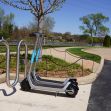Each day, Amazon ships about 1.6 million packages. Occasionally, one of them contains a defective product that harms its users. A second California District Court of Appeals has just ruled that it is time for a jury to decide whether the giant “online mall” is strictly liable for injuries caused by the products it sells.
California’s Second Appellate District reversed a summary judgment order on April 26, which said that a jury would not have to hear a case about a defective hoverboard that burst into flames when plugged into an electrical outlet. Last August, a San Diego appellate court reversed a different summary judgment order that was decided in favor of Amazon. That time, a replacement battery exploded. Now, both cases will proceed to trial and Amazon’s legal responsibility for the products it sells may be redefined.
Kisha Loomis sued Amazon after she was injured when her allegedly defective hoverboard, manufactured in China by a company named SMILETO and sold on Amazon under the name TurnUpUp, exploded. Amazon’s website describes a hoverboard as a “self-balancing electric scooter.” She placed her order on Amazon on November 28, 2015 and the fire occurred on December 31.
Los Angeles Superior Court Judge Sam Ohta, sitting on assignment, began the court’s opinion in Loomis v. Amazon, by stating, “The primary issue on appeal is whether Amazon may be strictly liable for Loomis’s injuries.” His opinion stated that he agreed with the August 2020 San Diego case Bolger v. Amazon in which a consumer was injured by an exploding laptop computer battery. In that case, the court held that Amazon was an “‘integral part of the overall producing and marketing enterprise that should bear the cost of injuries resulting from defective products.”
Ohta then wrote that the Court’s review of California law governing strict liability persuaded the panel that the San Diego summary judgment decision in Bolger was correct. The Court explained that Amazon describes itself as an “online mall” which provides an “online storefront” to third party sellers. In this case, China-based SMILETO provided the product, set the price and still holds title.
To be on the Amazon website, all third-party sellers like SMILETO, must sign a Services Business Solutions Agreement (BSA) that provides requirements for using Amazon’s website. The BSA also has requirements for pricing those items. It outlines payments to both parties and states that Amazon will “process all payments and will remit the purchase price to the seller, minus its service charge.” According to the court opinion, Amazon’s service fee for toys such as hoverboards, is 15 percent of the sale price. The TurnUpUp scooter sold for $370 and Amazon made $55.50 on each transaction. During the time between Loomis’s purchases of the hoverboard and the date of its explosion, TurnUpUp’s sales via Amazon totaled $736,366.68. Amazon received $110,645.92 in fees from those sales.
In November 2015, the media began reporting about 17 fires caused by hoverboards made by different manufacturers including TurnUpUp. On December 10, Amazon stopped selling the flammable scooters and they claim that they sent emails to all purchasers. Loomis testified that she did not remember getting any such email. The Consumer Product Safety Commission recalled the transportation devices in December, 2016.
Amazon’s BSA tries to shift responsibility for defects and the consequences of product recalls to its third- party sellers. It states, “Sellers also agree to indemnify Amazon from any liability arising from its products.” TurnUpUp’s pricing also mandated that the company “acquires excess insurance naming Amazon as an additional insured.”
Amazon buyers receive what the company calls an “A to Z Guarantee,” which sounds comprehensive, but carries this disclaimer: “Amazon, however, does not consider the A-to-z Guarantee to constitute a warranty for the products it lists. It instead warns purchasers in its Conditions of Use that third parties sell products through Amazon and that Amazon is “not responsible for examining or evaluating, and not warrant, the offerings of any of these businesses or individuals.... Amazon does not assume any responsibility or liability for the actions, product, and content of all these and any other third parties.
Loomis sued Amazon and other defendants in the vertical marketing chain for strict products liability, negligence, and a breach of warranty. Amazon moved for and received summary judgment on the grounds that it is “neither a manufacturer nor seller of the hoverboard.” In its April 26 opinion, the Court of Appeals ruled that there “exist triable issues of material fact which warrant reversal of summary adjudication as to these claims.”
Next, the Court opinion provided a review of California’s strict liability laws for manufacturers, retailers, and others “in the chain of distribution.” The Court cited three factors that would determine whether a “causative relationship of connection exists when the defendant falls outside the vertical chain of distribution. Using what it called the “marketing enterprise theory or stream of commerce approach,” Ohta stated that the plaintiff must show: “(1) the defendant received a direct financial benefit from its activities and from the sale of the product; (2) the defendant’s role was integral to the business enterprise such that the defendant’s conduct was a necessary factor in bringing the product to the initial consumer market; and (3) the defendant had control over, or a substantial ability to influence, the manufacturing or distribution process.”
Referring to Bolger, where an exploding battery echoed the circumstances of the fire-causing scooter, the court found that Amazon was “a direct link in the chain of distribution, acting as a powerful intermediary between the third-party seller and the consumer.” In addition, the court reviewed case law that “supported imposition of strict liability and rejected Amazon’s claim that it was “merely a service provider with no control over the product.” The court stated that Amazon had chosen to sell the product, stored it in Amazon warehouses, and shipped it to consumers. “It made these choices for its own commercial purposes. It should share in the consequences,” Ohta wrote.
The judge then stressed the public policy concern in strict liability law, including the responsibility to require proof that the products it sells meet safety standards. It also discussed a practical problem; the manufacturer of TurnUpUp is in China and Amazon “may be the only member of the distribution chain reasonably available for an injured consumer to recover damages.”
Justice John Shepard Wiley issued a concurring opinion that aptly describes how the world’s new consumer technology works and his hopes for the future. “The Amazon is the world’s largest river. Amazon.com supposedly chose its trademark because it aimed to create the world’s largest river of commerce. Amazon.com can control what it created… Once Amazon is convinced it will be holding the bag on these accidents, this motivation will prompt it to engineer effective ways to minimize these accident costs. Tort law will inspire Amazon to align its ingenuity with efficient customer safety. Customers will benefit.”
The jury that will now hear the two California cases about Amazon’s strict liability for the public safety related to the millions of products it sells. It is up to these juries to decide who will be responsible for protecting internet consumers in the commerce of the future.






